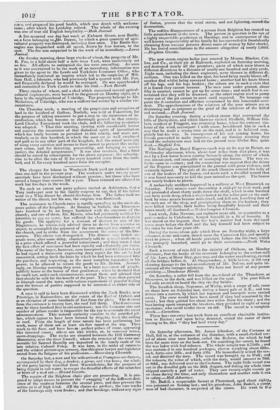The charges for labour in Woolwich Dock-yard are reduced more
than one-half in the present year. The worktneu under twenty years' servitude have been discharged without pension ; but those who have served a longer time receive 201. a year. Those retained are allowed to work but five days in the week.
To such an extent are party polities carried at Ashburton, that a Tory innkeeper sent to the family surgeon to say, that if his father went to a Whig dinner he should discharge him. The father took no notice of the threat, but his son, the surgeon, was dismissed.
The resistance to Church-rates is rapidly spreading to the most obscure points of the kingdom. At Bungay in Suffolk, the Dissenters have resolved to be no longer burdened with the expenses of the church ; and one of them, Mr. Morris, who had previously uotitied his intention to pay no more, has suffered the churchwardens to distntin his goods. On applying fbr a warrant of distress to one of the Magistrates, he strenuottely advised theta to desist from a course so unjust, to accomplish the payment of the rate amongst the members of the church, and to strike from the assessment the oatues of the Dissenters. This advice was disregarded. The distress was levied, the goods were, after some delay, clandestinely sold to a smell tradesman, at a price which offered a powerful inducement; they trusted that the first effort of resistance had been signally and effectually put :loon. The name of the buyer, however, soon transpired ; and wi z hill two days he had signed a document expressing deep regret for the act he had committed, setting forth the baits by which he had been entrapped into the purchase, and requesting, as the most complete reparation in his power, to be allowed to return the goods to Mr. Morrie. Accordingly, on Monday morning they were, by a large coeceurse of people, publicly borne to the house of that gentleman ; when he declared that he could not. under such circumstances, accept them, and advised that they-should be sold for the benefit of the poor. They were then paraded in triumph round the town, with various expressions of popular feeling near the houses of parties supposed to be interested on either side of the question.
A cave is said to have been discovered within the Nash Rocks, near Presteien, in Radnorshire, on the estate of the Earl of Oxford. and at an elevation of some hundreds of feet from the plain. The descent from the entrance is twenty feet, the roof full thirty. The dimensions may be three hundred feet in circumference ; but the immense size and number of pillars render it impossible for the eye to ascertain the exact admeaSurement This natural curiosity consists in the petrified pillars, which appear to have been formed by dripping from the ceiling or roof. From the length of time nature has been performing her work, many of them are at least six feet round at the top. They reach to the floor, and have beet m perfect pillars of stone, appearing like inverted cones ; others are like icicles, or, in common terms, eaves-droppings. The rocks are situated between the Hill Garraway Mountains, near the river Enwell ; where the remains of the ever-memorable Sir Samuel Romilly are deposited in the family vault of his late relative, Colonel Foley. It was here, in the midst of cataracts and the wildest picturesque scenery, that this great lawyer and legislator rested from the fatigues of his profession.—Shrewsbury Chronicle.
• On Saturday last, a man and his wife arrived at Frampton-oe-Severn, acCompanied by their dog, a donkey, a goose, and two hens; the whole of the party having travelled from Warwickshire, for the purpose of being dipped in salt water, to escape the dreadful effects of the scratches or bites of a mad 'cat.—Bristol Gazette..
The repairs of the thighton chain pier are proceeding. It is proposed to adopt means to prevent the "swagging" of the different divisions of the roadway between the several piers, and thus prevent the action on it of high wind. All the chains are perfect; the iron works of the footways only were broken; and that breakage, without any signs of fusion, proves that the wind storm, and not lightning, caused the destruction.
The sudden disappearance of a person from Brighton has created no little astonishment in the town. The person in question is the son of a highly respectable gentleman at Hastings, and in consequence of the well known respectability of his family he has succeeded in fraudulently obtaining from various persons divers sums of money by false checks. He has levied contributions to the amount altogether of nearly 1,000/. —Brighton Gazette.




















 Previous page
Previous page